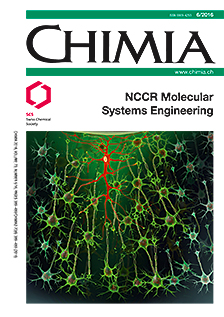Functional Nanopores: A Solid-state Concept for Artificial Reaction Compartments and Molecular Factories
DOI:
https://doi.org/10.2533/chimia.2016.432Keywords:
Bio-mimicking, Cell, Compartmentalization, Feedback, Molecular factories, Molecular transport, SensingAbstract
On the road towards the long-term goal of the NCCR Molecular Systems Engineering to create artificial molecular factories, we aim at introducing a compartmentalization strategy based on solid-state silicon technology targeting zeptoliter reaction volumes and simultaneous electrical contact to ensembles of well-oriented molecules. This approach allows the probing of molecular building blocks under a controlled environment prior to their use in a complex molecular factory. Furthermore, these ultra-sensitive electrical conductance measurements allow molecular responses to a variety of external triggers to be used as sensing and feedback mechanisms. So far, we demonstrate the proof-of-concept by electrically contacting self-assembled mono-layers of alkane-dithiols as an established test system. Here, the molecular films are laterally constrained by a circular dielectric confinement, forming a so-called 'nanopore'. Device yields above 85% are consistently achieved down to sub-50 nm nanopore diameters. This generic platform will be extended to create distributed, cascaded reactors with individually addressable reaction sites, including interconnecting micro-fluidic channels for electrochemical communication among nanopores and sensing sites for reaction control and feedback. In this scientific outlook, we will sketch how such a solid-state nanopore concept can be used to study various aspects of molecular compounds tailored for operation in a molecular factory.Downloads
Published
2016-06-29
Issue
Section
Scientific Articles
License
Copyright (c) 2016 Swiss Chemical Society

This work is licensed under a Creative Commons Attribution-NonCommercial 4.0 International License.
How to Cite
[1]
G. Puebla-Hellmann, M. Mayor, E. Lörtscher, Chimia 2016, 70, 432, DOI: 10.2533/chimia.2016.432.







